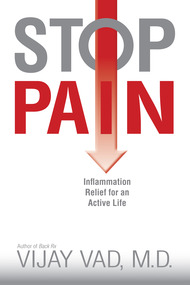Stopping Pain Without Drugs
 Here’s a quick interview with Dr. Vijay Vad, author of “Stop Pain.” He suggests exercise for chronic pain. Not quite on the stress illness bandwagon, but in its neighborhood:
Here’s a quick interview with Dr. Vijay Vad, author of “Stop Pain.” He suggests exercise for chronic pain. Not quite on the stress illness bandwagon, but in its neighborhood:
I have seen a big explosion in chronic back pain and arthritis, and what I realized is that people have very limited self-help options. In the medical system, unfortunately, many health care providers do what they are trained to do. They push you into prescription medications which have side effects or suggest tons of medical procedures.
Reducing “Self-Stigma”
A study uses something called Narrative Enhancement Cognitive Behavioral Therapy to address internalized stigma for people with mental illness.
The intervention is aimed at giving people with a mental illness the necessary tools to cope with the “invisible” barrier to social inclusion – self-stigma. [The study] showed that those who participated in the intervention exhibited a reduced self-stigma and, in parallel, an increase in quality of life and self-esteem.
CBT and Depression
A study suggests more C, less B is helpful in early weeks of Cognitive Behavioral Therapy treatment for depression. Also:
Patients improved more when they collaborated with their therapists about a plan for treatment and followed that plan. Not surprisingly, patients also showed greater improvement when they were more engaged in the therapy process and were open to suggestions from their therapist.
Mental Illness and Jails
Grim report: Mentally ill people are sent to jail more often than hospital.
As a result of the deinstitutionalization movement that began in the 1960s, though, “it is now extremely difficult to find a bed for a seriously mentally ill person who needs to be hospitalized,” Pavle and his co-authors write. In 1955, they write, there was one psychiatric bed for every 300 Americans. In 2005, there was one for every 3,000 Americans
Mindful Computing
Heard of this? Stillness Buddy. Designed for those who find themselves jumping from one thing to another on the computer without a second’s break or breath. From the site:
Stillness Buddy works by displaying on your desktop screen, short “moments of stillness” and longer “mindfulness pauses,” spread out during the day. These breaks are very brief so they don’t interfere with your work. You choose their duration and frequency to suit your preferences and schedule.
The program comes in four versions: Original, Stress Reduction, Barry Long, and Thich Nhat Hanh. Pick your flavor.
Another way to go: Leechblock. The Firefox add-on limits your ability to get to sites beyond a set amount of visits or minutes in an hour or day:
You can specify up to six sets of sites to block, with different times and days for each set. You can block sites within fixed time periods (e.g., between 9am and 5pm), after a time limit (e.g., 10 minutes in every hour), or with a combination of time periods and time limit (e.g., 10 minutes in every hour between 9am and 5pm).
So, if you’re checking Facebook over and over and over and over and want to cut down to just over and over, Leechblock’s there to help. If there aren’t already many other versions of the same available, I’m sure they’re on their way…
Maybe That’s Not an Allergy
Food Allergies Less Common Than Believed, says a study. How they did it: Disguised food and placebos (e.g., peanut butter hiding in something else or something else dressed up as peanut butter).
[T]he true incidence of food allergies is only about 8 percent for children and less than 5 percent for adults…[y]et about 30 percent of the population believe they have food allergies.
Not addressed: How many of those non-allergy allergies are due to stress?
The Science of a Happy Marriage
More wisdom from For Better posted by the book’s author: The Science of a Happy Marriage.
While there may be genetic differences that influence commitment, other studies suggest that the brain can be trained to resist temptation…
Studies Not Universal
With all the studies linked here, it’s well worth noting this: Psychological Research Not Always Universal; Studies Should Involve More Cross-Cultural Collaboration.
Previously, geographical barriers limited researchers’ ability to develop these relationships. Now, technology, such as Skype, can help scholars facilitate communication and work through possible cultural misunderstandings.
Video Games v. Pain
Headline: Video Games Help Relieve Pain.
“Virtual reality produces a modulating effect that is endogenous, so the analgesic influence is not simply a result of distraction but may also impact how the brain responds to painful stimuli,” said Jeffrey I. Gold, Ph.D.
But what if the pain was distraction in the first place…?
“For Better”
A review and excerpt of Tara Parker-Pope’s For Better: The Science of a Good Marriage, which surveys the research about what makes marriages work. From the book:
Is the story of your early courtship filled with nostalgia and optimism? Or is it tinged with negativity and regret? Do you remember getting lost in the rain together on your first date? Or do you just remember the fact that he refused to stop for directions?
Spouses who are in happy marriages often recount the early part of their relationship with laughter, smiles, and nostalgia — even when talking about difficult times like a job loss or financial struggles. Unhappy couples, however, tend to recast their past times together in a decidedly negative light.